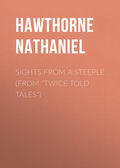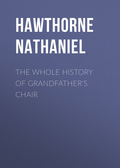
Натаниель Готорн
Fancy's Show-Box (From "Twice Told Tales")
The exhibition proceeded. One after another, Fancy displayed her pictures, all of which appeared to have been painted by some malicious artist, on purpose to vex Mr. Smith. Not a shadow of proof could have been adduced, in any earthly court, that he was guilty of the slightest of those sins which were thus made to stare him in the face. In one scene, there was a table set out, with several bottles, and glasses half filled with wine, which threw back the dull ray of an expiring lamp. There had been mirth and revelry, until the hand of the clock stood just at midnight, when murder stepped between the boon companions. A young man had fallen on the floor, and lay stone dead, with a ghastly wound crushed into his temple, while over him, with a delirium of mingled rage and horror in his countenance, stood the youthful likeness of Mr. Smith. The murdered youth wore the features of Edward Spencer! "What does this rascal of a painter mean?" cries Mr. Smith, provoked beyond all patience. "Edward Spencer was my earliest and dearest friend, true to me as I to him, through more than half a century. Neither I, nor any other, ever murdered him. Was he not alive within five years, and did he not, in token of our long friendship, bequeath me his gold-headed cane and a mourning ring?" Again had Memory been turning over her volume, and fixed at length upon so confused a page, that she surely must have scribbled it when she was tipsy. The purport was, however, that, while Mr. Smith and Edward Spencer were heating their young blood with wine, a quarrel had flashed up between them, and Mr. Smith, in deadly wrath, had flung a bottle at Spencer's head. True, it missed its aim, and merely smashed a looking-glass; and the next morning, when the incident was imperfectly remembered, they had shaken hands with a hearty laugh. Yet, again, while Memory was reading, Conscience unveiled her face, struck a dagger to the heart of Mr. Smith, and quelled his remonstrance with her iron frown. The pain was quite excruciating.
Some of the pictures had been painted with so doubtful a touch, and in colors so faint and pale, that the subjects could barely be conjectured. A dull, semitransparent mist had been thrown over the surface of the canvas, into which the figures seemed to vanish, while the eye sought most earnestly to fix them. But, in every scene, however dubiously portrayed, Mr. Smith was invariably haunted by his own lineaments, at various ages, as in a dusty mirror. After poring several minutes over one of these blurred and almost indistinguishable pictures, he began to see that the painter had intended to represent him, now in the decline of life, as stripping the clothes from the backs of three half-starved children. "Really, this puzzles me!" quoth Mr. Smith, with the irony of conscious rectitude. "Asking pardon of the painter, I pronounce him a fool, as well as a scandalous knave. A man of my standing in the world, to be robbing little children of their clothes! Ridiculous!" But while he spoke, Memory had searched her fatal volume, and found a page, which, with her sad, calm voice, she poured into his ear. It was not altogether inapplicable to the misty scene. It told how Mr. Smith had been grievously tempted, by many devilish sophistries, on the ground of a legal quibble, to commence a lawsuit against three orphan children, joint heirs to a considerable estate. Fortunately, before he was quite decided, his claims had turned out nearly as devoid of law as justice. As Memory ceased to read, Conscience again thrust aside her mantle, and would have struck her victim with the envenomed dagger, only that he struggled, and clasped his hands before his heart. Even then, however, he sustained an ugly gash.







